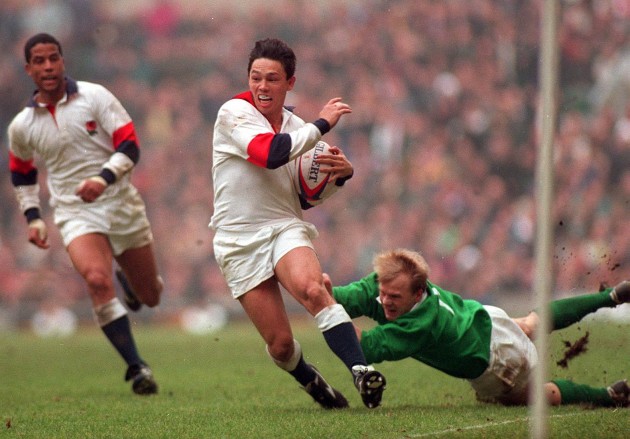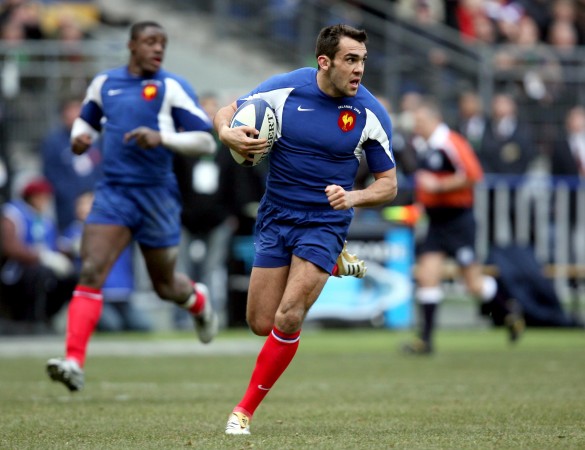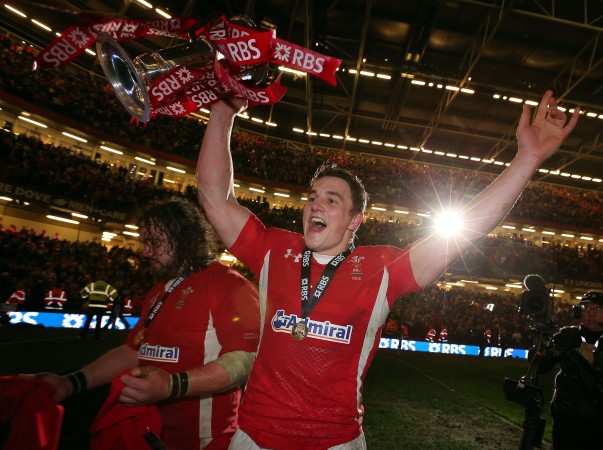Momentum. It’s a buzzword of this and any other Six Nations championship. Win your opening game and you’re set fair for the tournament, with every prize within your grasp. Lose and your hopes are dashed – no history-making Grand Slam this year, lads.
But a first-round defeat isn’t terminal. The losers of tonight’s Wales–England match in Cardiff may find solace in the following championship tales – three occasions when a team tripped at the first hurdle yet still went on to become European champions…
Fightback 1 – England in 1996
Jack Rowell was England’s coach for the first Five Nations of the pro era and his side for the opening match at Parc des Princes included two of this year’s coaching team, Mike Catt and Graham Rowntree.
Unfortunately for the reigning champions, they fell foul of a 20-year-old impish novice. Thomas Castaignede, making his championship debut, dropped a match-winning goal and then stuck out his tongue in salute. “My drop wasn’t beautiful but we won and it changed the beginning of my international career,” he said.
England bounced back as Jerry Guscott’s charge-down score and Rory Underwood’s 50th Test try toppled Wales at Twickenham.
Then Dean Richards, recalled because of injuries, gave one of the great No 8 performances to frustrate the Scots at Murrayfield. “They kicked the ball to me all afternoon and I wouldn’t let them have it back,” says the now Newcastle DoR. Amusingly, Richards had asked for a favour in return for answering England’s SOS – the RFU had requested he return a rowing machine and pager, and he asked Rowell to ensure the matter was dropped!
Paul Grayson’s six goals carried the day in Edinburgh but France’s earlier trouncing of Ireland meant the title was theirs to lose.
And lose it they did as Wales, without a championship win for two seasons, edged the French 16-15 at Cardiff in a triumphant return for fly-half Neil Jenkins.
For perhaps the first time in history, a Welsh win was greeted with a roar at Twickenham, where England were able to retain the title – pipping Scotland on points difference as France slipped to third – after a 28-15 victory over Ireland. Young flanker Lawrence Dallaglio was outstanding, and Jon Sleightholme’s try and Grayson’s boot did the damage on the scoreboard.
The trophy had to be rushed from Cardiff to Twickenham via train and taxi so that it could be presented to England captain Will Carling.
“It’s absolutely amazing to end as champions,” said Carling, who watched the second half from the stands after tearing ankle ligaments. “We wanted the Triple Crown but the Five Nations trophy didn’t seem a viable option.”
It was Carling’s last game as captain. He felt he was no longer doing justice to the role and resigned. Within a year his illustrious career, and a golden era, was over.
1996 results
France 15-12 England
England 21-15 Wales
Scotland 9-18 England
England 28-15 Ireland
Fightback 2 – France in 2006
France were the pre-tournament favourites, as they so often are after a Lions year, and they went to Murrayfield first up on the back of seven successive wins over Scotland. Coach Frank Hadden, a PE teacher who had done good things with Edinburgh, was starting his first Six Nations and his decision to select Mike Blair over Chris Cusiter at scrum-half proved inspired. Blair ran the show, Sean Lamont bagged two tries, and France left with a bloody nose.
Les Bleus made amends a week later as they made short work of Ireland, running in six tries to open up a 43-3 lead. It was crazy stuff, David Marty and Cedric Heymans each collecting doubles. Incredibly, however, Ireland rallied with four tries of their own, and the boos that greeted the erratic Frederic Michalak led coach Bernard Laporte to say of the fly-half’s detractors: “I’d have them thrown out of the stadium.”
Yet victory was achieved, as it was in round three, when France trailed at home to Pierre Berbizier’s Italy, 12-8. The jeers around the Stade de France had the desired effect as France, for whom the recalled Thomas Castaignede was at his creative best, ran in four second-half tries to emerge easy winners.
France saved their best for round four, crushing a feeble England side 31-6 to equal their record win in the fixture. Andy Robinson’s side never recovered from a high-ball mix-up in the early moments, Josh Lewsey’s hesitancy gifting Florian Fritz a try after 43 seconds. Damien Traille and Christophe Dominici also went on to cross the whitewash, Dimitri Yachvili kicked a heap of points, and Lewsey later called England’s performance a “shambles”.
And so to Cardiff, where Fritz’s late converted try, sliding over the line after catching Michalak’s dink over the top, was just enough against the reigning champions. Ireland, kicking off later, could have nicked the title with a landslide win at Twickenham but it didn’t happen and France had completed the perfect fightback after their eggy faces in Edinburgh.
Despite scoring a hefty 18 tries in the championship, France’s success was founded on a rock-steady scrum locked by props Sylvain Marconnet and Pieter de Villiers, with skipper Fabien Pelous a rallying leader and engine-room force. “I’m very proud of my players,” he said.
2006 results
Scotland 20-16 France
France 43-31 Ireland
France 37-12 Italy
France 31-6 England
Wales 16-21 France
Fightback 3 – Wales in 2013
Surely the pick of the three Six Nations fightbacks because, having committed the cardinal sin of losing at home, Wales faced three successive away games.
Has any title campaign ever begun so disastrously? With Brian O’Driscoll at his imperious best, Ireland steamrollered Wales at the Millennium Stadium, going 30-3 up after the Irish centre’s converted try early in the second half. Given Wales were on an eight-match losing streak, you wondered at the repercussions.
But the introduction of Justin Tipuric helped turn the tide and Wales lay siege to the visitors’ line thereafter. They scored three tries – through Alex Cuthbert, Leigh Halfpenny and Craig Mitchell – and Ireland, who lost Rory Best and Conor Murray to the sin-bin, were grateful to scramble home.
Wales lost 30-22 – suffering a fifth successive home defeat for the first time – but the mood had changed.
The away trips were to lack the drama of the two Cardiff matches. Wales went to Paris the next week and, in a poor spectacle, carved out a narrow win courtesy of George North’s late try as he pounced on Dan Biggar’s chip kick. North’s dad was so excited he ran onto the pitch.
Second-half tries by Jonathan Davies and Cuthbert helped see off Italy in Rome, then Scotland succumbed at Murrayfield in a woeful match that did more than anything else to bring about a change in the scrum laws. Amid a procession of collapsed scrums, we saw a world-record 18 penalty kicks at goal. Halfpenny kicked seven to Greig Laidlaw’s six and Richard Hibbard scored the only try.
Which set up a championship decider against England that has been revisited at length in recent days. Wales needed to win by eight points to take the title and deny England a Slam, and, in a caldron of bubbling fury, they stormed home on the back of a dominant scrum and Cuthbert’s blistering double. It is Wales’ record win in the fixture, although the 25-0 win in 1905 – which would be 39-0 with today’s points values – remains the high-water mark.
“It’s an even better feeling than winning the Grand Slam last year,” said Sam Warburton afterwards.
2013 results
Wales 22-30 Ireland
France 6-16 Wales
Italy 9-26 Wales
Scotland 18-28 Wales
Wales 30-3 England







